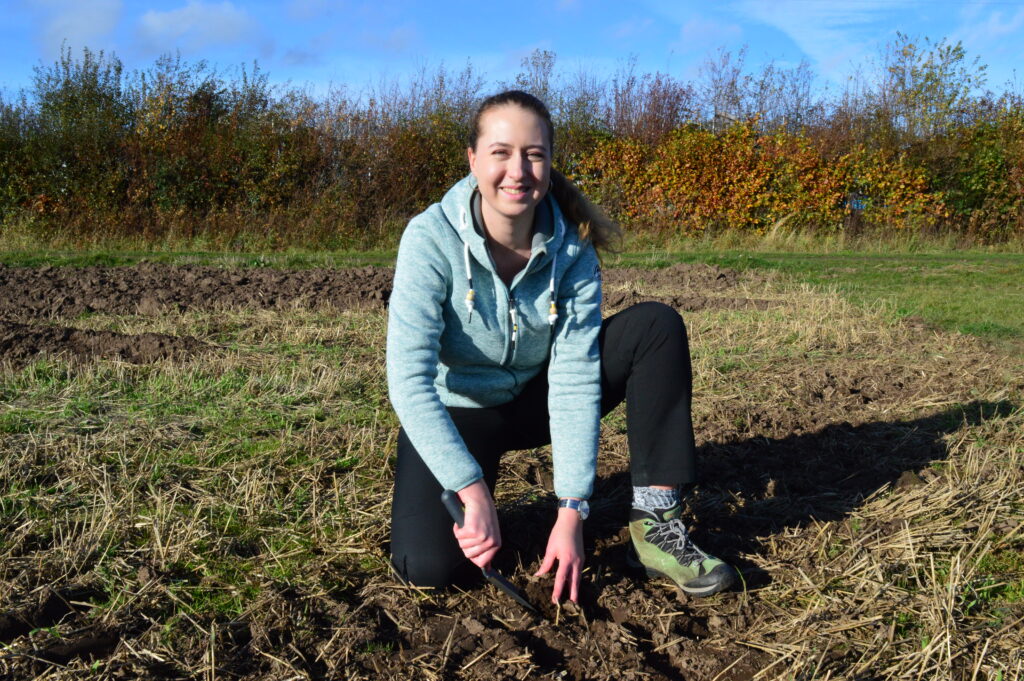Hutton hunts for soil ambassadors across Scotland to help dig deep
Scientists at The James Hutton Institute are leading a nationwide soil sampling campaign to help major European project, ECHO, to collect a total of 16,500 samples across Europe.
The project has kicked off a search for “ECHO Ambassadors” from across Scotland to help complete the mission.
Ambassadors will attend an informative workshop before they set out on their quest to spread the word about the importance of soil health and will be aiming to encourage communities to collect soil samples from their local area.
As one of the biggest carbon stores on our planet, the earth beneath our feet is vital to ecosystems. Commenting on the crucial role of soil and the project’s mission, Dr Karolina Trdlicova, citizen science coordinator on the ECHO project at The Hutton said: “Soil is hugely important as a foundation for our food systems, to nature and even for storing carbon.
“While there’s increasing awareness of the health of our rivers and air, the importance of soil, this amazing, non-renewable resource, is often overlooked. That means it is all too often becoming degraded with potentially detrimental consequences, and we need to protect and nurture its health and the incredible life in it.
“Through this project, we hope to build on the Institute’s renowned expertise in earth sciences. By involving the public directly, we can not only analyse our unique properties of Scottish landscapes but also help build the databases that will underpin future research and understanding.”
The James Hutton Institute is home to Scotland’s National Soil Archive, which contains more than 60,000 soil samples dating back to 1934. As one of the 16 partners on the project, The Hutton will also conduct extensive DNA analysis of the Scottish and wider European soils, helping to unearth the range of life within each sample.
“Through this project, we hope to build on the Institute’s renowned expertise in earth sciences. By involving the public directly, we can not only analyse our unique properties of Scottish landscapes but also help build the databases that will underpin future research and understanding.”
Dr Karolina Trdlicova, The James Hutton Institute

Aberdeen-based organisation, the North East Scotland Climate Action Network (NESCAN) and the North East Scotland Biodiversity Partnership (NESBiP), a local partnership hosted by The James Hutton Institute, have promoted ECHO’s recruitment call to encourage community participation.
Abbie Ferrar, Biodiversity Coordinator at NESBiP said: “People frequently overlook soil ecosystems while considering biodiversity, instead focusing on the quantity of pollinators, wildflowers, or birds. Yet, healthy soil life is crucial for those flowers and pollinators to thrive.
“Increased soil biodiversity, such as the presence of mycorrhizas, and low soil fertility have been found to increase pollinator visits to flowers and reduce the prevalence of thick, coarse grasses. This project is therefore crucial to better understanding the health of our soil and raising community awareness of its importance.”
Environmental charity, Keep Scotland Beautiful, has also shared its support by hosting a Q&A session about ECHO’s mission.
Juliette Camburn, Senior Officer for Community Initiatives at Keep Scotland Beautiful recently signed up to become an ambassador. Juliette said: “At Keep Scotland Beautiful, we support over 250 community growing groups across Scotland through our Climate and Nature Friendly Communities Network. Healthy soil is essential for anyone involved in community growing, and understanding what makes soil healthy is key.
Becoming an ECHO Ambassador has been a great way to raise awareness of soil health and inspire our groups to get involved.”
Supported by EU and UK Research and Innovation (UKRI) funding, the samples collected through ECHO will be used for ECHOREPO, a new open-access soil data bank.
This resource will enable scientists, policymakers, farmers, landowners and the general public to make informed decisions about land use and conservation. The repository will be open for access in 2027, once additional samples from across Europe have been gathered and analysed.
If you’d like to become involved as a soil ambassador, you can visit and sign up here https://echosoil.eu/become-an-echo-ambassador
Press and media enquiries:
Eesha Devgan – Eesha@clarkcommunications.co.uk / 0131 589 2013
